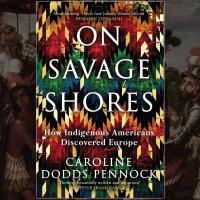On Savage Shores takes a fascinating look at the Atlantic World of the sixteenth century, but rather than adding to the voluminous literature about how the West 'discovered' the Americas, Caroline Dodds Pennock comes at the story from the other side: how the various Indigenous American peoples explored and experienced Europe. It is a novel, intriguing idea, and one that has been crying out to be written for years.
It is also a difficult idea to realize: as Pennock acknowledges, the sources – particularly those written by the Indigenous travellers themselves – are few and far between. So there is the unenviable process of combing through seemingly unrelated documents, scouring for hints and brief mentions, allowing – even more than usual – for writer's bias, and making leaps of faith based upon oral histories, later writings, and wider knowledge. There might be a reason why a popular history on this subject has not been attempted before.
Luckily for the reader, Pennock has completed the task with élan. Not only has she managed to find, tease and then tug on enough threads to form a coherent argument, but she has also reconstructed an astonishing number of characters from the evidence, turning them from mere objects of curiosity into individuals, acting sometimes under their own agency, sometimes at the behest of others, but always in an authentic, convincing manner. Despite the magnitude of her topic, her style is light and engaging, her language considered, her narrative balanced, her points powerful and extremely pertinent. There is a relevancy to the book, not just in it fitting with the trend in historical research to explore beyond the Eurocentric vision of the world and the embracing of other peoples and cultures, but in the critique it provides of the way in which our society is constructed. Implicit across the book is the suggestion that there are other ways to live, in greater harmony not just with ourselves and our communities, but with the planet itself.
And this is what On Savage Shores does best: it makes readers question their own versions of history and challenges some very deeply held notions. The internet is strewn with reviews criticizing elements of this book – complaints that Indigenous peoples are idealized; that a few thousand Indigenous travellers in Europe across a century do not constitute enough of a movement to justify a reworking of ‘History’; that there is nothing wrong with Native peoples being objects of curiosity; that it is simply ‘Progress’ – and, more nastily, of the author herself. But these reactions strongly emphasize the point that this book should be read, not just to challenge assumptions and provide new – and much-needed – insight, but to make the reader ponder the purpose of history. Because On Savage Shores makes history come alive, not just in the usual way of bringing a certain era, or a certain people, into the foreground, but the very discipline of history itself is invigorated by its contribution. It encourages its readers to ask what the purpose of historical narratives actually is: should they bring communities together in shared myths; or constantly challenge old assumptions; or just be a way of hearing interesting stories? Whatever the conclusions to which we come, this act of exploration is enlightening. We discover new interpretations of the past, and new understanding about ourselves. Sometimes it is good to visit foreign countries.


